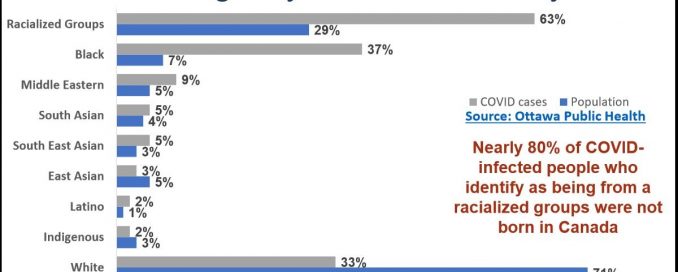Updates on COVID Equity Data Project
April 30, 2021OLIP’s Health and Wellbeing Sector Table initiated the Strengthening Disaggregated Sociodemographic Data Related to COVID-19 project, which worked to address and mitigate the disproportionate impact of COVID-19 on immigrant and racialized communities through the collection and use of disaggregated data across OLIP partners. This project funded by Ottawa Community Foundation used three strategic components of partnerships, research, and mobilization to successfully design and implement six key activities.
As part of the strategic component of partnerships, two activities focused on developing and strengthening partnerships on data advocacy, data sharing agreements, and collaborative reporting. These project activities resulted in the development and strengthening of five data partnerships including IRCC, OPH, and the City of Ottawa.
For the strategic component of research, OLIP partnered with two research teams to advance our understanding of equity data capacity. Dr. Josephine Etowa, an Associate Professor in Public Health at University of Ottawa, with her team of health researchers developed a health equity indicator-based framework and key recommendations to support health equity research and measurement. These recommendations are key to help guide connected planning across sectors to improve health and wellbeing outcomes. Dr. Tracey Lauriault, an Associate Professor in Critical Media and Big Data at Carleton University and a Masters’ student Madeleine Le Jeune conducted in-depth interviews with 15 partners to understand the collection, analysis, use and governance of socio-demographic data throughout their organization.
As part of the strategic component of engagement, OLIP engaged immigrant and racialized communities, and enhanced organizations’ capacities to be responsive to immigrant communities’ needs. This activity collated and adapted community stories of the disproportionate effects of COVID-19. OLIP also supported knowledge sharing across partners and communities on the use of disaggregated data to engage key communities as well as identify and disseminate effective practices.
This project builds on a multi-sectoral effort to highlight the inequities experienced by immigrant and racialized community. This initiative aims to improve evidence-based and equitable planning for these communities and collaborative interventions across sectors. To build on the substantial progress made on this project, OLIP has secured funding from the Department of Canadian Heritage and the City of Ottawa to curating progress on equity data and to further support OLIP partners’ data capacity.


 We are very pleased to have done the “Opportunity Cost of Not Investing in Interpretation” report – it is so important to have clarity on these challenges and…
We are very pleased to have done the “Opportunity Cost of Not Investing in Interpretation” report – it is so important to have clarity on these challenges and…
